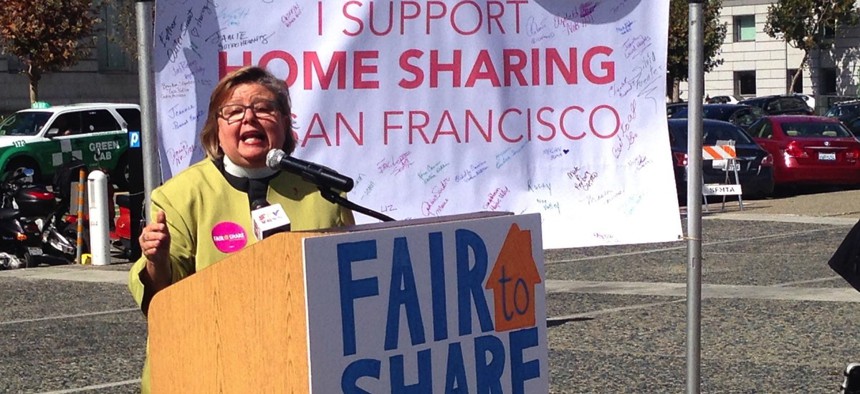Airbnb vs. the Hotel Industry: Big Lobbying and Influence Skirmishes Play Out in States and Localities

Rev. Melinda V. McLain speaks to members of HomeSharersSF during an October 2014 rally at San Francisco City Hall before a vote on the Airbnb Law. Kevin Krejci / Flickr.com
The Center for Public Integrity maps out the money the short-term rental and hotel industries are spending in state capitals and city halls in a new report.
State and local governments across the nation are seeing an influx of legislation aimed at making users of short-term rental websites like Airbnb play by hotel rules.
Upwards of 60 bills in 23 states could require homeowners to pay occupancy taxes and surcharges or abide by hotel safety and sanitary regulations, the Center for Public Integrity reports, should they be deemed traditional hoteliers.
And both sides are pulling out all the stops to influence decisionmakers and the general public. The CPI report details lobbying efforts, campaign donations and the funding of “grassroots” public education efforts, including Neighbors for Overnight Oversight, which is funded by the American Hotel & Lodging Association.
“We can educate attorneys general, policymakers, third parties,” Airbnb’s head of global public policy, David Hantman, told CPI. “There’s a lot of misinformation.”
Airbnb donated at least $920,000 to state-level candidates during the 2014 elections to compete with the hotel industry’s $11 million, according to CPI, and the hotel industry has lobbyists across 42 states compared to the short-term rental industry’s 22.

Among the concerns that many local governments considering new laws and regulations in the short-term rental policy arena have: By making it easier for sharing-economy companies like Airbnb to operate, are they missing out on potential hotel tax revenue. And how are short-term rentals impacting affordable housing and neighborhood quality of life?
Because no two cities’ hotel and lodging policies are exactly the same, Airbnb has to pick its battles—challenging ordinances where there’s the greatest opportunity for widespread change.
Read the Center for Public Integrity’s complete report.
(Photo by Kevin Krejci / Flickr.com)
Dave Nyczepir is News Editor at Government Executive’s Route Fifty.
NEXT STORY: Boston tackles double-parking with Waze data






